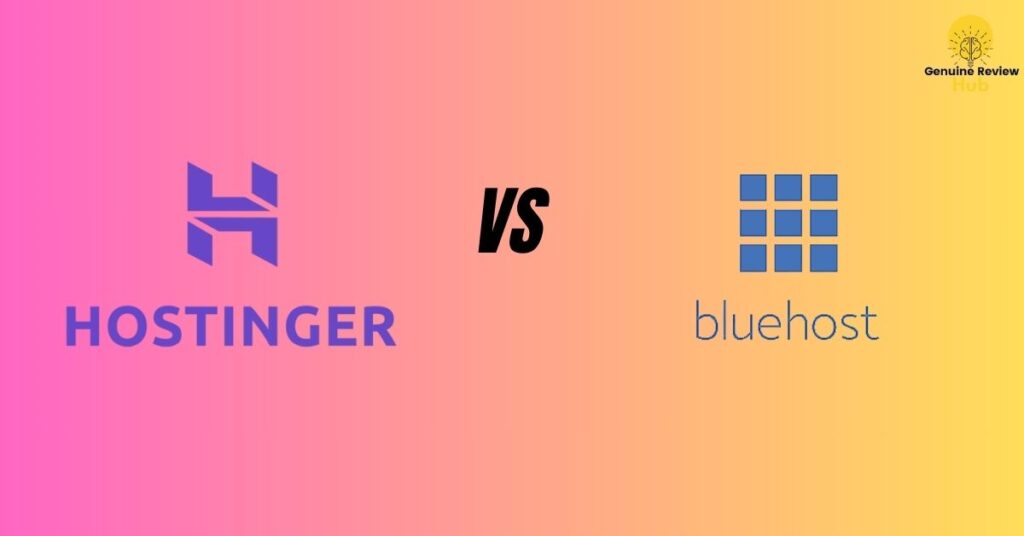In 2023, Hostinger vs. BlueHost both offer reliable web hosting services, but your choice depends on your specific needs. Hostinger is the budget-friendly option with excellent performance, while BlueHost provides top-notch customer support and is great for scalability. To determine the best fit for you, read on for our in-depth comparison.
Table of Contents
Hostinger vs. Bluehost: Pricing Comparison
When it comes to choosing a web hosting provider, one of the first factors that often comes to mind is pricing. In our Hostinger vs. BlueHost comparison for 2023, we’ll break down the pricing plans for both providers to help you make an informed decision.
Hostinger Pricing:
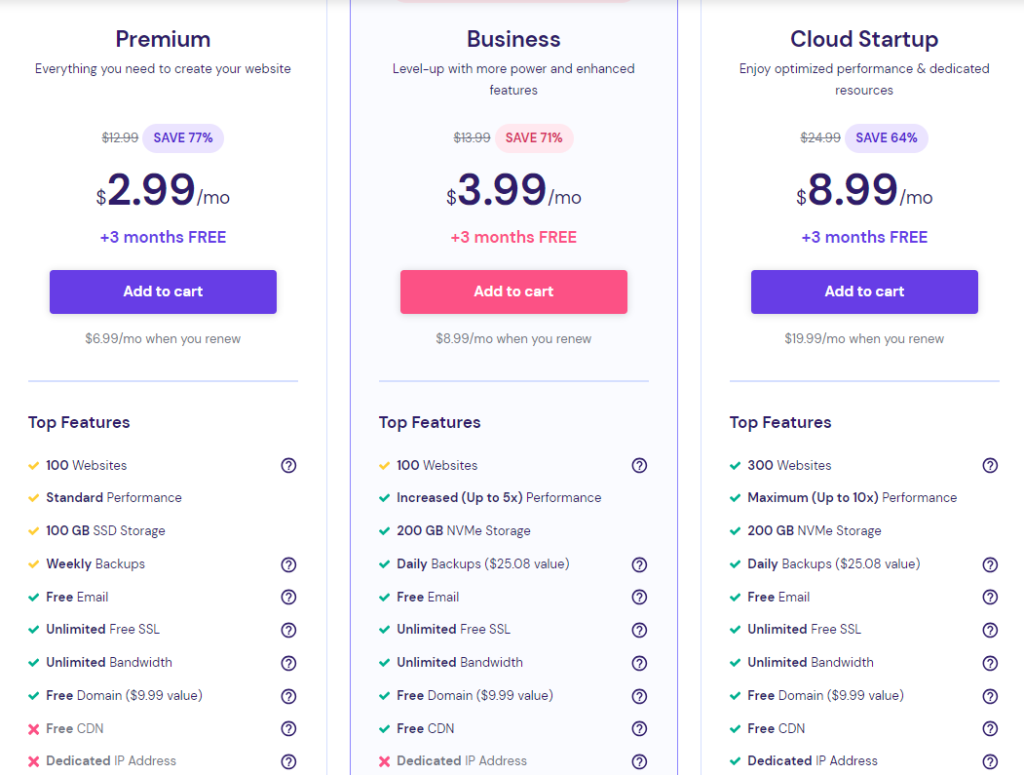
Hostinger is known for its budget-friendly hosting solutions. They offer three main shared hosting plans:
- Premium Shared Hosting: Starting at just $2.99 per month (with a longer-term commitment), this plan is ideal for small personal websites or blogs. It includes one website, 100 GB of SSD storage, and a free SSL certificate.
- Business Shared Hosting: Priced at $3.99 per month (with a longer-term commitment), this plan offers unlimited websites, unlimited SSD storage, a free domain for the first year, and enhanced performance.
- Cloud Startup Shared Hosting: At $8.99 per month (with a longer-term commitment), this plan adds even more features, including daily backups, free CDN, a WordPress accelerator, and priority support.
Please note that these prices are promotional rates and may increase upon renewal. Click here to learn more about Hostinger pricing and plans.
Bluehost Pricing:
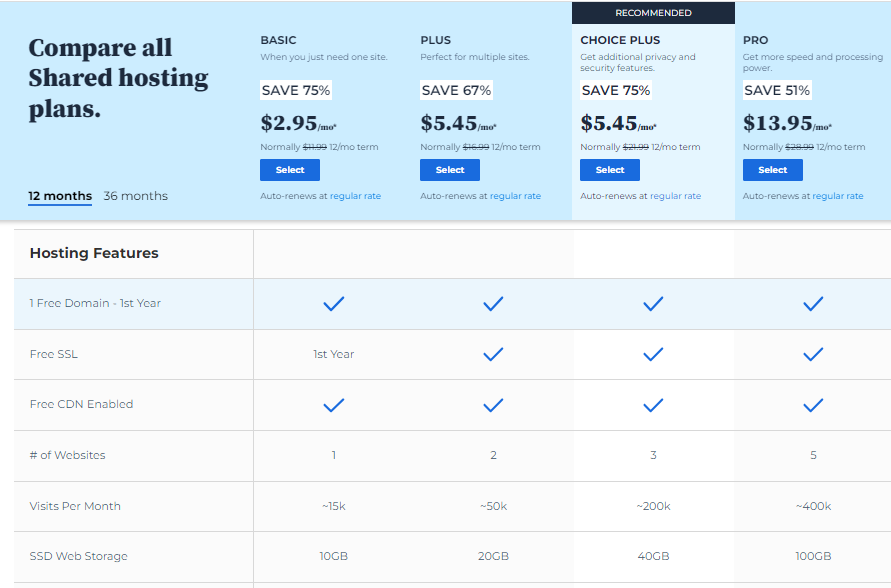
BlueHost also offers competitive pricing with a focus on WordPress hosting. Their shared hosting plans are as follows:
- Basic Plan: Starting at $2.95 per month (for the initial term), this plan includes one website, 50 GB of SSD storage, a free domain for the first year, and free SSL.
- Plus Plan: Priced at $5.45 per month (initial term), this plan offers unlimited websites, SSD storage, and additional features like spam protection and website backups.
- Choice Plus Plan: At $5.45 per month (initial term), this plan includes all the features of the Plus Plan, along with domain privacy and site backup pro.
- Pro Plan: Starting at $13.95 per month (initial term), this plan includes high-performance servers, a dedicated IP, and other advanced features.
BlueHost’s promotional rates are generally more stable compared to Hostinger, making it easier to plan your long-term budget. Click here to learn more about Bluehost pricing and plans.
Conclusion:
In terms of pricing, Hostinger takes the lead for budget-conscious users, especially with its low-cost entry-level plan. BlueHost offers competitive rates, particularly for those looking for WordPress-focused hosting. However, keep in mind that renewal rates for both providers may be higher than the initial promotional rates, so it’s essential to consider your long-term hosting needs when making a decision.
Hostinger vs. Bluehost: Performance Comparison
When it comes to web hosting, performance is a critical factor that can significantly impact your website’s user experience and search engine rankings. In our Hostinger vs. BlueHost comparison for 2023, we’ll analyze the performance of both hosting providers to help you choose the right one for your needs.
Hostinger Performance:
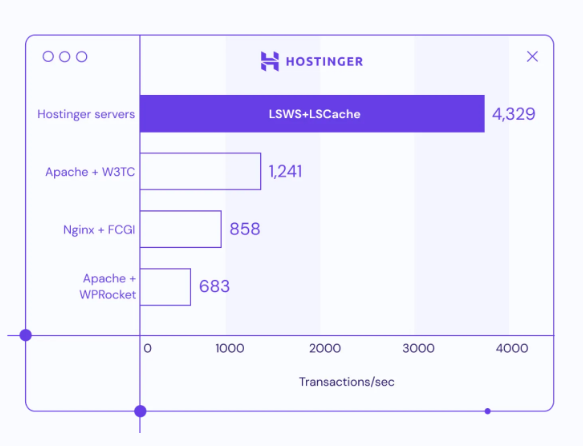
Hostinger has gained a reputation for offering impressive performance, especially considering its budget-friendly pricing. Here are some key performance factors to consider:
- Loading Speed: Hostinger leverages high-speed SSD (Solid State Drive) storage, LiteSpeed caching, and Cloudflare integration to ensure fast loading times for your website. This is essential for retaining visitors and improving your search engine rankings.
- Uptime Reliability: Hostinger consistently maintains a strong uptime record, often exceeding the industry-standard 99.9% uptime guarantee. A reliable hosting service ensures that your website is accessible to users and search engine crawlers at all times.
- Data Center Locations: Hostinger has data centers strategically located in different regions worldwide. This means your website can benefit from reduced latency and faster access for visitors from various geographic locations.
Bluehost Performance:
Bluehost, on the other hand, offers robust performance features, particularly tailored for WordPress users:
- WordPress Optimization: BlueHost is officially recommended by WordPress.org and has a strong focus on WordPress hosting. Their infrastructure is finely tuned to deliver optimal WordPress performance.
- SSD Storage: BlueHost provides SSD storage for faster data retrieval and shorter loading times, which is vital for user satisfaction and SEO.
- Uptime Guarantee: BlueHost also maintains a solid uptime track record, ensuring your website’s availability and search engine visibility.
Conclusion:
Both Hostinger and BlueHost deliver commendable performance, making them suitable choices for hosting your website. Hostinger’s performance is noteworthy, especially given its cost-effective plans, while BlueHost shines with its WordPress-specific optimizations. To determine which one is best for you, consider your website’s specific needs, such as whether you’re running WordPress or a different platform, and your budget constraints. Ultimately, a hosting provider that offers excellent performance will contribute to your website’s success and its ability to rank well on Google.
Hostinger vs. Bluehost: User-Friendliness Comparison
When choosing a web hosting provider, it’s essential to consider how user-friendly their platform is, especially if you’re new to website management. In this Hostinger vs. BlueHost comparison for 2023, we’ll assess the user-friendliness of both hosting providers to help you make an informed decision.
Hostinger User-Friendliness:

Hostinger is renowned for its straightforward and intuitive user interface, making it an excellent choice for beginners and experienced users alike. Here are some key aspects of Hostinger’s user-friendliness:
- Control Panel: Hostinger provides a user-friendly custom control panel. It’s clean, organized, and easy to navigate, allowing you to manage your hosting account and website effortlessly.
- One-Click Installs: Hostinger offers one-click installation options for popular content management systems (CMS) like WordPress, Joomla, and Drupal. This simplifies the process of setting up a website, even for beginners.
- Website Builder: Hostinger includes a website builder with its hosting plans. This drag-and-drop tool allows you to create a website without any coding knowledge.
- Knowledge Base: Hostinger offers an extensive knowledge base and helpful tutorials, making it easy to find answers to common questions and troubleshoot issues.
BlueHost User-Friendliness:
BlueHost is also designed with user-friendliness in mind, particularly for WordPress users. Here are some user-friendly features of Bluehost:
- WordPress Integration: BlueHost’s platform seamlessly integrates with WordPress. They offer a one-click WordPress installation, making it incredibly easy to set up a WordPress-powered website.
- Custom Control Panel: BlueHost uses a custom control panel, which is intuitive and user-friendly. It simplifies hosting management tasks and provides quick access to essential features.
- Website Builder: BlueHost offers a website builder, similar to Hostinger. It’s a user-friendly tool for creating websites without coding skills.
- 24/7 Customer Support: BlueHost’s customer support is known for being responsive and helpful. This can be a significant advantage for users who may need assistance along the way.
Conclusion:
Both Hostinger and BlueHost excel in terms of user-friendliness. Hostinger’s clean and straightforward control panel, along with its website builder, makes it an excellent choice for beginners. BlueHost, on the other hand, is especially user-friendly for WordPress enthusiasts. It offers seamless integration and excellent customer support. Your choice should depend on your specific needs and familiarity with website management tools. Rest assured, both providers are committed to ensuring a user-friendly hosting experience.
Hostinger vs. Bluehost: Security Comparison
Website security is a paramount concern in today’s digital landscape, and choosing a web hosting provider with robust security measures is crucial. In this Hostinger vs. BlueHost comparison for 2023, we’ll examine the security features offered by both hosting providers to help you make an informed decision.
Hostinger Security:
Hostinger prioritizes security and provides several features to protect your website:
- SSL Certificates: Hostinger offers free SSL certificates with its hosting plans. SSL encrypts data transmitted between your website and visitors, enhancing security and trust.
- Firewall Protection: Hostinger employs web application firewalls (WAFs) to block malicious traffic and protect against common online threats.
- Regular Backups: Hostinger performs daily or weekly backups, depending on your plan, allowing you to restore your website to a previous state in case of data loss or security issues.
- DDoS Protection: Hostinger provides DDoS (Distributed Denial of Service) protection to safeguard your website from large-scale attacks that can disrupt its availability.
Bluehost Security:
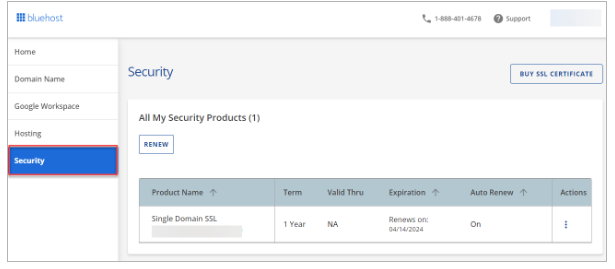
Bluehost also takes security seriously and offers a range of protective measures:
- SSL Certificates: Similar to Hostinger, BlueHost provides free SSL certificates with its hosting plans to secure data transmission.
- SiteLock Security: BlueHost offers SiteLock, a comprehensive security tool that scans your website for vulnerabilities, malware, and threats. It helps you address security issues promptly.
- Daily Backups: BlueHost includes daily website backups with its hosting plans, ensuring that you can restore your site’s data in case of unexpected incidents.
- Spam Protection: BlueHost provides spam protection to filter out unwanted emails, reducing the risk of phishing attacks and email-related security threats.
Conclusion:
Both Hostinger and BlueHost offer solid security features to protect your website and data. They include SSL certificates, firewall protection, regular backups, and additional security tools. The choice between them in terms of security should depend on your specific needs and preferences. Consider the level of security you require and whether you need additional tools like SiteLock. Rest assured, both hosting providers are committed to helping you maintain a secure online presence in 2023.
Hostinger vs. Bluehost: Pros and Cons
Choosing the right web hosting provider involves considering the advantages and disadvantages of each option. In this Hostinger vs. BlueHost comparison for 2023, we’ll break down the pros and cons of both hosting providers to help you make an informed decision.
Pros of Hostinger:
- Affordable Pricing: Hostinger offers some of the most budget-friendly hosting plans, making it an excellent choice for cost-conscious users.
- Excellent Performance: Hostinger boasts impressive loading speeds and reliability, especially given its low prices.
- User-Friendly Interface: Hostinger’s user-friendly control panel and website builder make it suitable for beginners.
- Global Data Centers: With data centers strategically located worldwide, Hostinger ensures fast website access for users across the globe.
- Free SSL Certificates: SSL security is included for free with all plans, enhancing website trust and SEO.
Cons of Hostinger:
- Renewal Rates: While the initial prices are low, renewal rates can be higher, so it’s essential to plan your budget accordingly.
- Customer Support: Some users have reported mixed experiences with Hostinger’s customer support.
Pros of Bluehost:
- WordPress Integration: BlueHost is officially recommended by WordPress.org and offers seamless WordPress integration, making it an ideal choice for WordPress users.
- Reliable Uptime: BlueHost maintains a strong uptime record, ensuring your website’s availability.
- User-Friendly: BlueHost’s custom control panel is intuitive, and they provide excellent customer support to assist users.
- Security Features: BlueHost includes features like SiteLock security and daily backups to enhance website protection.
- Scalability: BlueHost offers a variety of hosting options, suitable for both small websites and large businesses.
Cons of Bluehost:
- Pricing Fluctuations: While BlueHost’s promotional prices are competitive, renewal rates can increase substantially.
- Less Affordable Entry-Level Plan: The lowest-priced plan may not be as budget-friendly as some alternatives in the market.
Conclusion:
In summary, Hostinger stands out for its affordability and excellent performance, making it an attractive choice for those on a tight budget. On the other hand, BlueHost offers WordPress-specific advantages, reliability, and scalability, making it a solid choice for users seeking a reliable and versatile hosting provider. Your choice between the two should align with your specific needs, budget, and long-term hosting goals.
Hostinger vs. Bluehost: Summary
| Feature | Hostinger | BlueHost |
| Pricing | Budget-friendly plans with low initial costs, but higher renewal rates | Competitive pricing with potential renewal rate increases |
| Performance | Excellent loading speeds and uptime | Strong performance, especially for WordPress users |
| User-Friendliness | User-friendly control panel and website builder | Intuitive interface, WordPress-focused |
| Security | SSL certificates, firewall, regular backups | SSL certificates, SiteLock security, daily backups |
| Customer Support | Responsive support, but mixed reviews | Excellent customer support, 24/7 availability |
| Scalability | Suitable for various website sizes | Offers scalable hosting options |
| WordPress Integration | Supports WordPress, but not exclusively | Officially recommended for WordPress |
| Global Data Centers | Data centers worldwide for improved loading times | Multiple data centers for reliable performance |
| Free SSL Certificates | Included with all plans for enhanced security | Provided with all plans to secure data transmission |
| Overall Verdict | Excellent choice for budget-conscious users, with great performance | Reliable and versatile hosting, especially for WordPress users |
In our comprehensive comparison of Hostinger and BlueHost for 2023, Hostinger emerges as the preferred choice for several compelling reasons:
1. Affordability: Hostinger offers exceptionally budget-friendly hosting plans, making it the go-to option for cost-conscious users. With low initial prices, Hostinger provides excellent value for your money.
2. Excellent Performance: Hostinger delivers impressive loading speeds and uptime reliability, even at its affordable price points. This means your website will load quickly and stay accessible to users and search engine crawlers.
3. User-Friendly: Hostinger’s user-friendly control panel and website builder cater to beginners and experienced users alike. The straightforward interface simplifies website management tasks.
4. Global Data Centers: Hostinger’s strategically located data centers worldwide ensure fast website access for visitors from different regions, contributing to a positive user experience.
5. Free SSL Certificates: SSL security is included for free with all Hostinger plans, enhancing website trust and SEO, which is crucial for ranking well on search engines.
While BlueHost is a reputable hosting provider with its own strengths, such as WordPress integration and reliability, Hostinger’s combination of affordability, performance, and user-friendliness makes it the better choice for many users in 2023. It excels in delivering high-value hosting solutions, especially for those starting or maintaining a website on a tight budget.

